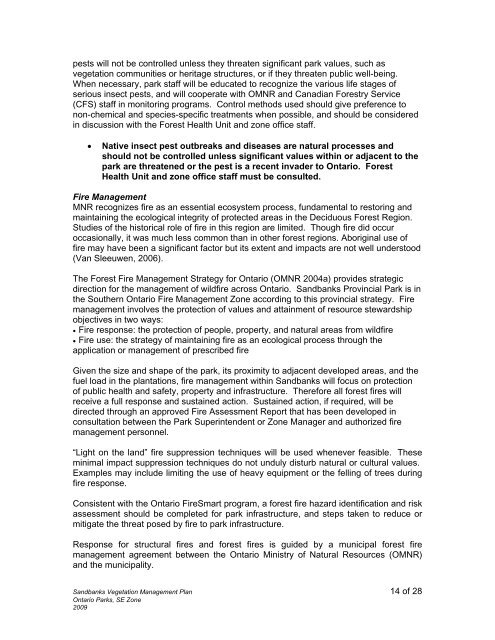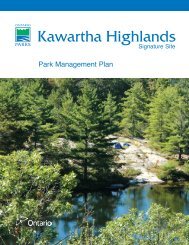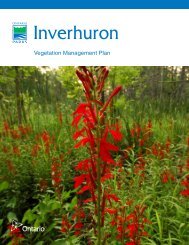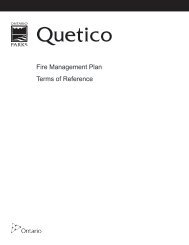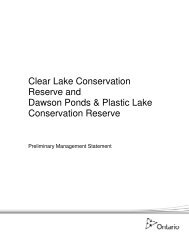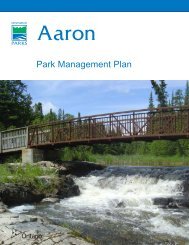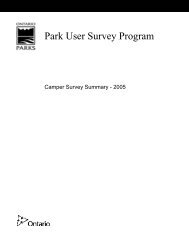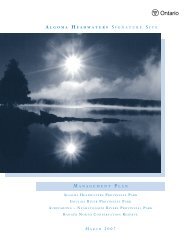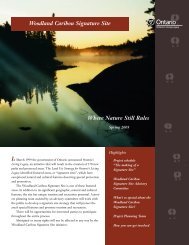Sandbanks Draft Veg Mgmt Plan - Ontario Parks
Sandbanks Draft Veg Mgmt Plan - Ontario Parks
Sandbanks Draft Veg Mgmt Plan - Ontario Parks
You also want an ePaper? Increase the reach of your titles
YUMPU automatically turns print PDFs into web optimized ePapers that Google loves.
pests will not be controlled unless they threaten significant park values, such as<br />
vegetation communities or heritage structures, or if they threaten public well-being.<br />
When necessary, park staff will be educated to recognize the various life stages of<br />
serious insect pests, and will cooperate with OMNR and Canadian Forestry Service<br />
(CFS) staff in monitoring programs. Control methods used should give preference to<br />
non-chemical and species-specific treatments when possible, and should be considered<br />
in discussion with the Forest Health Unit and zone office staff.<br />
• Native insect pest outbreaks and diseases are natural processes and<br />
should not be controlled unless significant values within or adjacent to the<br />
park are threatened or the pest is a recent invader to <strong>Ontario</strong>. Forest<br />
Health Unit and zone office staff must be consulted.<br />
Fire Management<br />
MNR recognizes fire as an essential ecosystem process, fundamental to restoring and<br />
maintaining the ecological integrity of protected areas in the Deciduous Forest Region.<br />
Studies of the historical role of fire in this region are limited. Though fire did occur<br />
occasionally, it was much less common than in other forest regions. Aboriginal use of<br />
fire may have been a significant factor but its extent and impacts are not well understood<br />
(Van Sleeuwen, 2006).<br />
The Forest Fire Management Strategy for <strong>Ontario</strong> (OMNR 2004a) provides strategic<br />
direction for the management of wildfire across <strong>Ontario</strong>. <strong>Sandbanks</strong> Provincial Park is in<br />
the Southern <strong>Ontario</strong> Fire Management Zone according to this provincial strategy. Fire<br />
management involves the protection of values and attainment of resource stewardship<br />
objectives in two ways:<br />
• Fire response: the protection of people, property, and natural areas from wildfire<br />
• Fire use: the strategy of maintaining fire as an ecological process through the<br />
application or management of prescribed fire<br />
Given the size and shape of the park, its proximity to adjacent developed areas, and the<br />
fuel load in the plantations, fire management within <strong>Sandbanks</strong> will focus on protection<br />
of public health and safety, property and infrastructure. Therefore all forest fires will<br />
receive a full response and sustained action. Sustained action, if required, will be<br />
directed through an approved Fire Assessment Report that has been developed in<br />
consultation between the Park Superintendent or Zone Manager and authorized fire<br />
management personnel.<br />
“Light on the land” fire suppression techniques will be used whenever feasible. These<br />
minimal impact suppression techniques do not unduly disturb natural or cultural values.<br />
Examples may include limiting the use of heavy equipment or the felling of trees during<br />
fire response.<br />
Consistent with the <strong>Ontario</strong> FireSmart program, a forest fire hazard identification and risk<br />
assessment should be completed for park infrastructure, and steps taken to reduce or<br />
mitigate the threat posed by fire to park infrastructure.<br />
Response for structural fires and forest fires is guided by a municipal forest fire<br />
management agreement between the <strong>Ontario</strong> Ministry of Natural Resources (OMNR)<br />
and the municipality.<br />
<strong>Sandbanks</strong> <strong>Veg</strong>etation Management <strong>Plan</strong> 14 of 28<br />
<strong>Ontario</strong> <strong>Parks</strong>, SE Zone<br />
2009


